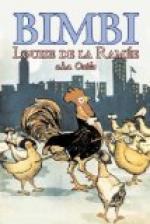Findelkind, however, was very fond of his books; he would study day and night, in his little ignorant, primitive fashion. He loved his missal and his primer, and could spell them both out very fairly, and was learning to write of a good priest in Zirl, where he trotted three times a week with his two little brothers. When not at school, he was chiefly set to guard the sheep and the cows, which occupation left him very much to himself; so that he had many hours in the summertime to stare up to the skies and wonder— wonder—wonder about all sorts of things; while in the winter—the long, white, silent winter, when the post-wagons ceased to run, and the road into Switzerland was blocked, and the whole world seemed asleep, except for the roaring of the winds—Findelkind, who still trotted over the snow to school in Zirl, would dream still, sitting on the wooden settle by the fire, when he came home again under Martinswand. For the worst—or the best—of it all was that he was Findelkind.
This is what was always haunting him. He was Findelkind; and to bear this name seemed to him to mark him out from all other children and to dedicate him to heaven. One day three years before, when he had been only six years old, the priest in Zirl, who was a very kindly and cheerful man, and amused the children as much as he taught them, had not allowed Findelkind to leave school to go home, because the storm of snow and wind was so violent, but had kept him until the worst should pass, with one or two other little lads who lived some way off, and had let the boys roast a meal of apples and chestnuts by the stove in his little room, and, while the wind howled and the blinding snow fell without, had told the children the story of another Findelkind—an earlier Findelkind, who had lived in the flesh on Arlberg as far back as 1381, and had been a little shepherd lad, “just like you,” said the good man, looking at the little boys munching their roast crabs, and whose country had been over there, above Stuben, where Danube and Rhine meet and part.
The pass of Arlberg is even still so bleak and bitter that few care to climb there; the mountains around are drear and barren, and snow lies till midsummer, and even longer sometimes. “But in the early ages,” said the priest (and this is quite a true tale that the children heard with open eyes, and mouths only not open because they were full of crabs and chestnuts), “in the early ages,” said the priest to them, “the Arlberg was far more dreary than it is now. There was only a mule track over it, and no refuge for man or beast; so that wanderers and peddlers, and those whose need for work or desire for battle brought them over that frightful pass, perished in great numbers, and were eaten by the bears and the wolves. The little shepherd-boy Findelkind—who was a little boy five hundred years ago, remember,” the priest repeated—“was sorely disturbed and distressed to see these poor dead souls in the snow




